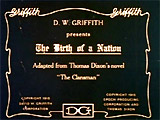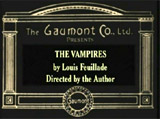
|
![]()
Greatest Films of the Pre-1920s
1902 | 1903 | 1914 | 1915 | 1916 | 1919
Title Screen Film Genre(s), Title, Year, (Country), Length, Director, Description 




The Birth of a Nation (1915), 187 minutes, D: D. W. Griffith
Director Griffith's historical epic film (America's first) was based on former North Carolina Baptist minister Rev. Thomas Dixon Jr.'s anti-black, 1905 bigoted melodramatic staged play, The Clansman. A controversial but landmark film, known for its racist attitudes, and also for advancement of the art of film-making, with new techniques of cross-cutting and editing. It told the story of the intersecting lives and continuing friendship between a Northern family (the Stonemans in Pennsylvania) and a Southern slave and land-owning family (the Camerons in Piedmont, South Carolina) during the Civil War and post-Civil War Reconstruction period. Each of the families was headed by a powerful patriarch - abolitionist and Hon. US Congressman Austin Stoneman (Ralph Lewis), and Dr. Cameron (Spottiswoode Aitken). In 1860, Phil Stoneman (Elmer Clifton) and his younger brother Tod Stoneman (Robert Harron) paid a visit to Phil's best boarding-school friend Ben Cameron (Henry B. Walthall) living in the South. During the trip, Phil Stoneman fell in love with Ben's eldest sister Margaret Cameron (Miriam Cooper), while Ben - after seeing a photograph of the sole Stoneman daughter, Elsie Stoneman (Lillian Gish) - became infatuated and idolized her. Once the Civil War began, the two families were caught up in the struggle, and young men from both families enlisted in the Union and Confederate armies. The separation of the domestic families and the couples by war and disunion served as a symbol of the political divisions between North and South. The Cameron women were rescued by Confederate state troops who routed a black Northern militia guerrilla force attacking the Cameron home. The younger Stoneman son Tod and two Cameron sons, Duke (Maxfield Stanley) and Wade (George Beranger) were killed in action. Wade was killed during Sherman's march and bombardment of Atlanta. Elsie volunteered as a nurse in the Union military hospitals in the North, in Washington, DC. Fighting with the Confederate forces of General Lee, Ben Cameron led a desperate and heroic final charge (filmed at a high angle with a moving-camera shot) at the Siege of Petersburg against the Union command of Capt. Phil Stoneman, earning the nickname of "the Little Colonel." Ben was seriously wounded in action and taken to a military hospital set up in the Patents Office where Elsie Stoneman was a nurse. Ben finally met Elsie, the girl of his dreams. He showed her the picture of her that he had carried around for a long, long time. During a visit to see her son, Mother Cameron (Josephine Crowell) met with President Lincoln (Joseph Henabery) and received a pardon for her condemned son. Gen. Lee surrendered to Gen. Grant at Appomattox Courthouse in April of 1865. The same day, Ben ("The Little Colonel") was discharged and returned to his ruined home in the film's most touching and poignant sequence. Meanwhile, Congressman Austin Stoneman, father of Phil and Elsie, agitated for the punishment of the South, but President Lincoln refused to take revenge. However, following Lincoln's assassination at Ford's Theatre, it marked the rapid descent of the South into disorder and chaos. During the harsh Reconstruction Era, Congressman Austin Stoneman, champion of black equality, advanced the power of blacks by appointing his protege and mulatto (half African-American) aide Silas Lynch (George Siegmann) to lead the blacks and rally the black vote in the South. In his headquarters set up in Piedmont, SC, Silas Lynch also enforced the rule of blacks and carpetbaggers, leading to the exploitation and corruption of the former slaves. He encouraged Southern blacks to rise up and oppress the traitorous Southern whites. He also led black militia in their efforts to take over the South. The Stoneman family also moved to Piedmont, due to Austin's ailing health. During the next election, Negroes and carpetbaggers swept the state in the election, and were elected to a largely-black legislature. Silas Lynch was elected Lieutenant Governor and became a fierce zealot for "black supremacy." Upset by the recent developments, Ben organized together with other southerners to form a secret vigilante group, the Ku Klux Klan, known for their white garb and night-riding activities. Because of wartime divisions and hostilities, Ben became estranged from Elsie who remained loyal to her father's efforts. A troubling incident occurred when emancipated former house servant/slave - the inflamed, lusty Negro "renegade" Gus (Walter Long) pursued Little Sister Flora (Mae Marsh), and she fell off a cliff to her death. The KKK sought retaliation - they apprehended Gus, ruled him guilty, and lynched him. Silas Lynch ordered negro militia reinforcements to fill the streets, and declared the penalty for being a Klan member was death by execution. The Camerons, servants and Phil Stoneman fled from town and took refuge in a little isolated cabin. To intercede for her father, Elsie proceeded to the mulatto leader Silas Lynch for help, where he lustfully advanced upon her and attempted to force her into marriage. Simultaneously, Klansmen were summoned on horseback (first a few upright white male riders, then a group, then a horde of white-sheeted figures) as Lynch cornered the horrified, frightened and screaming Elsie. The Klan gathered in full strength for rescue in a "head-on" tracking shot. Elsie was saved by her repulsed father who confronted Lynch. The film concluded with an intense, action-packed, stupendous, last-minute rescue finale, a thrilling climax with masterful parallel editing - interweaving the siege on the cabin, the chaos in Piedmont, Elsie's fate at the hands of Silas Lynch, and the onrushing rescue by the Klan. The KKK drove back Lynch's black militia from Piedmont after a bloody gun battle, rescued Elsie from Lynch's clutches before she or Austin Stoneman were hurt, captured Lynch, and saved the besieged cabin from a rabble of blacks and carpetbaggers. The blacks were crushed and disenfranchised in future politics. The two couples (in the Cameron and Stoneman families) were brought together by marriage and a "double honeymoon" - Phil and Margaret were reconciled, and Ben and Elsie sat by the sea's edge, symbolic of the peaceful rejoining of North and South after many battles and the painful Reconstruction period. A tableau with a benevolent Christ-like figure emerged from the background, signifying the vanquishing of the God of war, and the reign of everlasting peace, unity, harmony and brotherhood throughout the world.


Les Vampires (1915, Fr.) (aka The Vampires), 399 minutes, D: Louis Feuillade
In this French silent film serial (with ten chapters) by director/writer Feuillade, subversive vampire thieves sucked the blood out of sleeping bourgeois Parisian society, and stole their jewels. The villainous leader of the vamps was Irma Vep (Musidora), an anagram for VAMPIRE. The partly scripted, partly-improvised episodes (with eye-catching titles like "The Severed Head" and "The Ring That Kills") followed investigative journalist Philippe Guérande (Édouard Mathé) and his comic sidekick Oscar Mazamette (Marcel Lévesque) in their continued attempts to foil The Vampire Gang's elaborate schemes and gadgets.